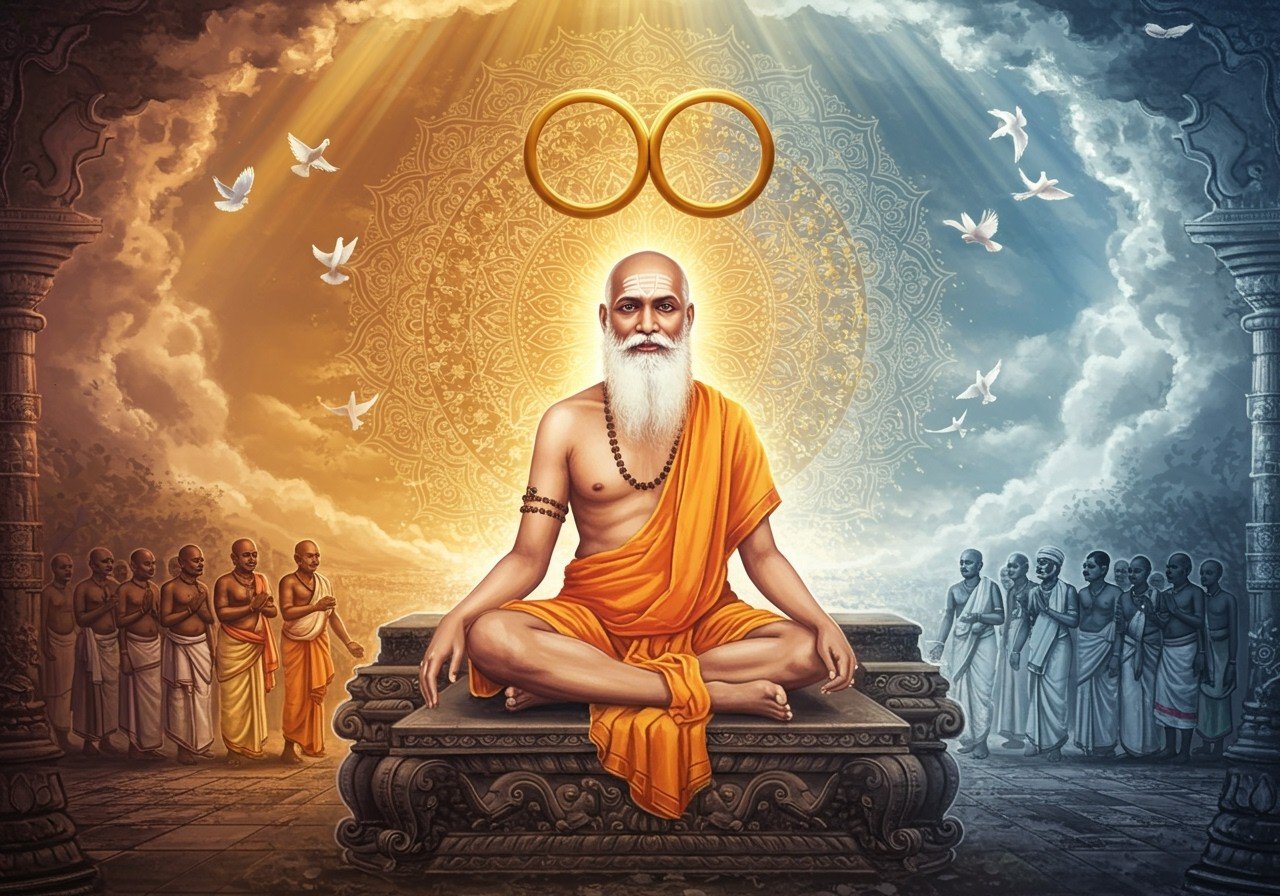
Sree Narayana Guru (1856–1928), a revered philosopher, spiritual leader, and social reformer, illuminated the path towards a more just and equitable society in Kerala, India. His profound teachings and tireless efforts challenged the deeply ingrained caste system, advocating for spiritual enlightenment and social equality for all. His message, “One Caste, One Religion, One God for All,” resonated deeply with the masses and continues to inspire generations striving for a world free from discrimination.
The Context of Kerala’s Social Landscape
In the late 19th and early 20th centuries, Kerala’s social fabric was tightly woven with the threads of a rigid caste hierarchy. Lower castes faced severe discrimination, denied basic human rights such as access to education, entry into temples, and even the right to walk freely on public roads. Born into the Ezhava caste, traditionally marginalized, Sree Narayana Guru’s personal experiences fueled his unwavering commitment to social reform. This period also coincided with British colonial rule, a time that presented both obstacles and opportunities for change within Indian society.
-
Caste Hierarchy: Kerala’s social structure was strictly divided along caste lines, creating deep inequalities.
-
Social Practices: Discriminatory practices against lower castes were rampant, denying them fundamental rights and opportunities.
-
Colonial Rule: The presence of British rule added another layer of complexity to the existing social dynamics, influencing the reform movement in various ways.
The Dawn of a Movement: Aruvippuram and Beyond
Sree Narayana Guru’s impact on Kerala’s social reform landscape is undeniable. In 1888, his consecration of a Shivalinga at Aruvippuram marked a pivotal moment. This act, performed by a non-Brahmin, shattered age-old conventions and ignited a spark of revolution against caste discrimination. It signaled a new era where spiritual authority was no longer solely the domain of the upper castes.
Learn more about the significance of temples and rituals.
Guru’s efforts extended far beyond Aruvippuram. He established more than 40 temples across Kerala, opening the doors of spiritual solace to all, regardless of caste. In some temples, he chose to install mirrors instead of traditional idols, symbolizing the divine presence within each individual, a powerful message of equality and self-realization. You can find a variety of sacred items for your personal puja space at Poojn.in’s Holy Idols collection.
Education, Guru believed, was the key to empowerment. He established schools with a focus on enlightening marginalized communities, emphasizing the importance of knowledge as a tool for social upliftment. He championed education, cleanliness, devotion to God, organization, and agriculture, encouraging industries for economic independence. Explore resources like the Srimad Bhagavad Gita available on Poojn.in to deepen your understanding of spiritual teachings.
A Meeting of Minds: Gandhiji and Sree Narayana Guru
Mahatma Gandhi, deeply moved by Sree Narayana Guru’s work, saw in him a kindred spirit. Guru’s emphasis on unity and equality resonated with Gandhi’s own vision for a just and harmonious India. While their approaches differed, both leaders shared a common dream of a society free from the shackles of caste. Discover traditional items for your puja needs at Poojn.in’s Holy Utensils collection.
Gandhi’s fight against untouchability drew inspiration from Guru’s pioneering work. The principles championed by Guru found an echo in Gandhi’s philosophy of non-violence and equality, shaping the course of India’s struggle for social justice. Poojn.in offers a wide selection of Holy Food items to enhance your spiritual practices.
United for Change: Ayyankali and Sree Narayana Guru
Sree Narayana Guru’s collaboration with Ayyankali, another prominent social reformer, further amplified the movement for social change in Kerala. Together, they championed the rights of marginalized communities, focusing on education and the welfare of agricultural laborers. Find essential puja materials at Poojn.in, including Mahosadhi and Green Mung Dal.
While Guru’s approach was rooted in philosophical and spiritual teachings, Ayyankali’s activism centered on grassroots mobilization and direct action. This blend of strategies created a powerful synergy, driving the movement towards greater inclusivity and social justice.
A Legacy of Equality: The SNDP Yogam
The legacy of Sree Narayana Guru lives on through the SNDP Yogam, an organization he founded to carry forward his vision. The SNDP continues to advocate for social equality, self-respect, and the empowerment of marginalized communities, ensuring that Guru’s message remains relevant and impactful even today.
Poojn.in: Supporting the Vision of Unity
Poojn.in is proud to support Sree Narayana Guru’s vision by making authentic puja supplies and religious items accessible to all. We believe that everyone, regardless of their background, should have the opportunity to engage in spiritual practices with dignity and ease. Our online store offers a wide range of traditional items, delivered conveniently to your doorstep. Poojn.in also provides Holy Cosmetics and Holy Jewellery to enhance your spiritual experience.
Have questions about specific items or need help with your order? Our customer service team is here to assist you. You can reach us at 03369029784 or via WhatsApp at 9476142738. Explore our complete collection at www.poojn.in.
Continuing the Conversation: FAQs about Sree Narayana Guru
What were Sree Narayana Guru’s core beliefs? Sree Narayana Guru advocated for “One Caste, One Religion, One God for Mankind,” emphasizing social equality, spiritual enlightenment, and the inherent divinity within each individual. His teachings transcended caste barriers and promoted unity amongst all people.
How did Sree Narayana Guru challenge the caste system? He directly confronted caste discrimination through symbolic acts like the Aruvippuram Pratishta, where he consecrated a Shivalinga as a non-Brahmin. He also established temples open to all castes, defying traditional restrictions. His consistent message of equality challenged the very foundation of the caste system.
What is the significance of the Vaikom Satyagraha in relation to Sree Narayana Guru? Sree Narayana Guru’s disciples played a crucial role in the Vaikom Satyagraha, a movement advocating for temple entry rights for lower castes. Though not directly involved, his teachings and influence inspired those fighting for social justice and access to spiritual spaces for all. Learn more about the Vaikom Satyagraha at this informative blog post.
A Timeless Message of Unity
Sree Narayana Guru’s call for “One Caste, One Religion, One God” continues to resonate across generations. His relentless fight against caste discrimination and his unwavering belief in equality left an enduring legacy. By opening temple doors to all and using mirrors to symbolize the divinity within each person, he taught us to recognize the sacredness in every individual, regardless of social standing. His alliances with figures like Gandhiji and Ayyankali amplified his message of social justice, creating a ripple effect that transformed society. As we reflect on his legacy, we draw inspiration and guidance for building a more equitable and harmonious world, grounded in the richness of our traditions and the power of progressive thought.


